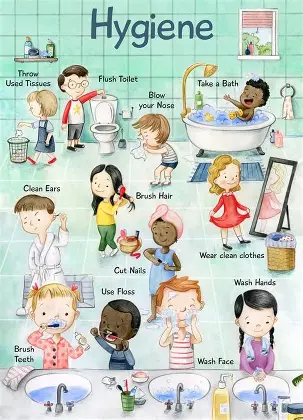Herein this article, we discussed What Is Digital Hygiene? 6 Essential Digital Hygiene Habits for Kids, How Parents and Educators Can Help, Why It Matters.
In today’s digital world, teaching kids to take care of their online health is just as important as teaching them to brush their teeth or wash their hands. With screens being an everyday part of their lives—from schoolwork to entertainment—children are growing up in an environment where digital hygiene needs to be a basic life skill.
What Is Digital Hygiene?
Digital hygiene refers to the habits and practices that help individuals stay safe, respectful, and healthy in the digital space. This includes everything from protecting personal information and using secure passwords to managing screen time and avoiding harmful content.
Just like physical hygiene prevents illness, good digital hygiene protects children from cyber threats, online predators, and emotional burnout.
Why It Matters
Children today are “digital natives,” but that doesn’t automatically mean they’re digitally responsible. Without guidance, they can fall into harmful patterns such as:
. Oversharing personal details online
. Falling for scams or phishing messages
. Experiencing cyberbullying
. Getting addicted to screen time
. Consuming inappropriate content
. Failing to understand the long-term impact of their digital footprints
By teaching digital hygiene, we empower kids to navigate the online world confidently and responsibly.
Essential Digital Hygiene Habits for Kids
Here are six key areas where parents and educators can instill healthy digital habits:
- Protect Personal Information
Teach kids to keep sensitive details—like full name, address, school name, and passwords—private. Help them understand that not everyone online is who they say they are.
- Use Strong Passwords
Encourage them to create strong, unique passwords and explain why they shouldn’t reuse the same one across multiple platforms. Consider using a family password manager for older children.
- Think Before Sharing
Whether it’s photos, videos, or status updates, kids should be taught to pause and think: Is this kind, necessary, and appropriate? Could it hurt me or someone else later on?
- Balance Screen Time
Promote a balanced relationship with devices. Set tech-free times (like during meals and before bed), and encourage outdoor play, hobbies, and face-to-face interactions.
- Recognize Red Flags
Help kids identify warning signs of cyberbullying, phishing, or scams. Role-playing and real-life examples can be very effective in reinforcing these lessons.
- Be Respectful Online
Digital citizenship starts with kindness. Teach kids to treat others online the same way they’d like to be treated. Explain the consequences of trolling, gossip, or hurtful comments.
How Parents and Educators Can Help
. Model good behavior. Kids mimic adults. If you’re constantly on your phone or oversharing, they’ll do the same.
. Start conversations early. Talk openly about what they see and do online. Make digital hygiene a regular part of your family or classroom discussions.
. Use tools wisely. Parental controls and monitoring apps are helpful, but they’re not a substitute for trust and open communication.
. Keep learning. Technology evolves fast. Stay informed so you can guide your child through new challenges and platforms.
CONCLUSION
Digital hygiene isn’t a one-time lesson—it’s a lifelong practice. By teaching kids to be mindful, respectful, and secure online, we equip them with the tools to thrive in an increasingly digital world.
Teaching digital hygiene is an ongoing journey, not a one-time lesson. As technology evolves, so too will the challenges and opportunities our children face online. By fostering an environment of trust, open dialogue, and consistent guidance, we can empower them to be smart, safe, and responsible digital citizens, ensuring their online health and well-being for years to come

